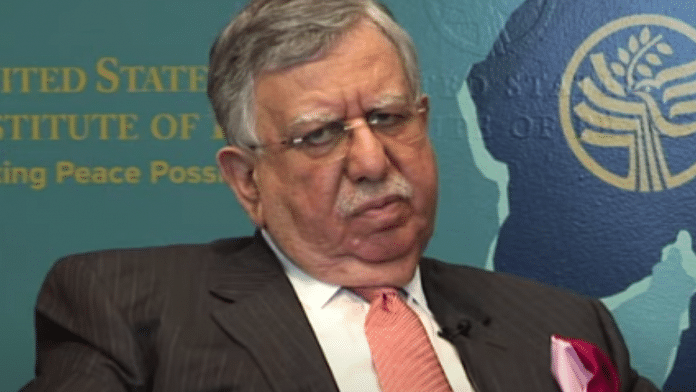Pakistan is a country where even a former finance minister can face sedition charges – it all depends on power and who has it. Now that the Imran Khan-led Pakistan Tehreek-e-Insaf is no longer in power, many of its leaders are facing sedition charges.
Shaukat Tarin, who was the finance minister when Khan was in power, is facing charges for allegedly stalling talks with the International Monetary Fund in 2022. The Federal Investigation Agency filed the FIR, invoking Section 124-A and 505 of the Pakistan Penal Code, Monday.
According to the FIR, Tarin told Punjab and Khyber Pakhtunkhwa finance ministers not to return the surplus budget to the federal government, with an aim to hurt then-ongoing deals between Pakistan and the IMF. The FIA also reportedly conducted an inquiry into a leaked audio clip of the conversation.
The FIR was registered a day after the Shehbaz Sharif government ‘allowed’ the FIA to arrest him.
Also read: Imran Khan to Bilawal Bhutto, Pakistan leaders use a common term when trading barbs—terrorist
Increasing count
Tarin is not the only Pakistani politician subjected to such a steep fall from grace. Since 1947, Pakistan has had a history of politicians being slapped with sedition charges.
A report by Samaa English shows that since April 2022, five politicians from the opposition have been booked for sedition, including Tarin.
Apart from the former finance minister, who was mentioned in the Pandora Papers as well, PTI leader Shandana Gulzar, former information minister Fawad Chaudhry, sitting senator Azam Swati, and PTI chief-of-staff Shehbaz Gill have been booked in the last 10 months.
Gulzar and Gill were arrested for making controversial remarks on television shows. They were subsequently accused of ‘inciting hatred’ against state institutions. Chaudhry is an outspoken critic of the Shehbaz government and was booked for making statements against the Election Commission of Pakistan (ECP). Swati, on the other hand, was arrested for an “obnoxious tweet”.
Hamza Ali Haroon, a researcher at Harvard University, wrote in Dawn about the “vagueness” of the sedition law, calling it a “colonial relic” being brandished in a “political drama”.
“In Pakistan, sedition laws are used as a short-term fix for governments to avoid being held accountable for their actions and silencing political opponents that dare speak truth to power. These laws have no place in a democratic society,” wrote Haroon.
Other governments in Pakistan have also wielded the sedition law in a similar fashion. In April 2004, Pakistan Muslim League (N) leader Makhdoom Javed Hashmi was sentenced to 23 years in jail following a directive from then-President General Pervez Musharraf. His release was ordered by the Supreme Court in August 2007.



